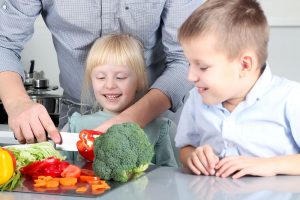December 1, 2022
 It is important to establish healthy eating habits in your program and to discuss healthy eating with the children in your care. Since children may eat snacks and meals each day in your program, you can make a difference that can have a positive effect for a lifetime.
It is important to establish healthy eating habits in your program and to discuss healthy eating with the children in your care. Since children may eat snacks and meals each day in your program, you can make a difference that can have a positive effect for a lifetime.
A nutrition policy and weekly menu can help teach children about healthy eating habits. Think about how you can promote a healthy diet:
- How many fresh fruits and vegetables do you serve each week?
- Do you limit the amount of fat, sugar, and salt served?
- Do you monitor and supplement meals and snacks brought from home, if children bring in unhealthy food?
A great way to create healthy eating habits is to teach children how to make their own meals and snacks. Cooking and preparation is fun and engaging and is a great learning and developmental opportunity. Cooking activities allow you to choose healthy ingredients and can encompass multiple domains, including:
- Physical development: Chopping, mixing, and spreading develop small muscle control.
- Personal and social development: Following directions (a picture recipe) and problem-solving encourage independence and confidence. Children can also learn about other cultures through a variety of foods and recipes.
- Language development: Recipes include new vocabulary for young learners, and the process of the activity develops spoken language skills.
- Cognitive development: Cooking offers opportunities for problem-solving, predictions, and curiosity.
Here are a few books that discuss healthy food or contain recipes:
- “End of the Rainbow Fruit Salad (Kitchen Club Kids),” by Marianne Welsh
- “Garden Safari Vegetable Soup (Kitchen Club Kids),” by Marianne Welsh
- “Eating the Alphabet,” by Lois Ehlert
- “Stone Soup” (multiple editions)
- “Cactus Soup,” by Eric A. Kimmel
From gathering the ingredients to creating delicious snacks and meals, healthy eating is not only good for the body, but good for young, developing minds.




 GO BACK
GO BACK